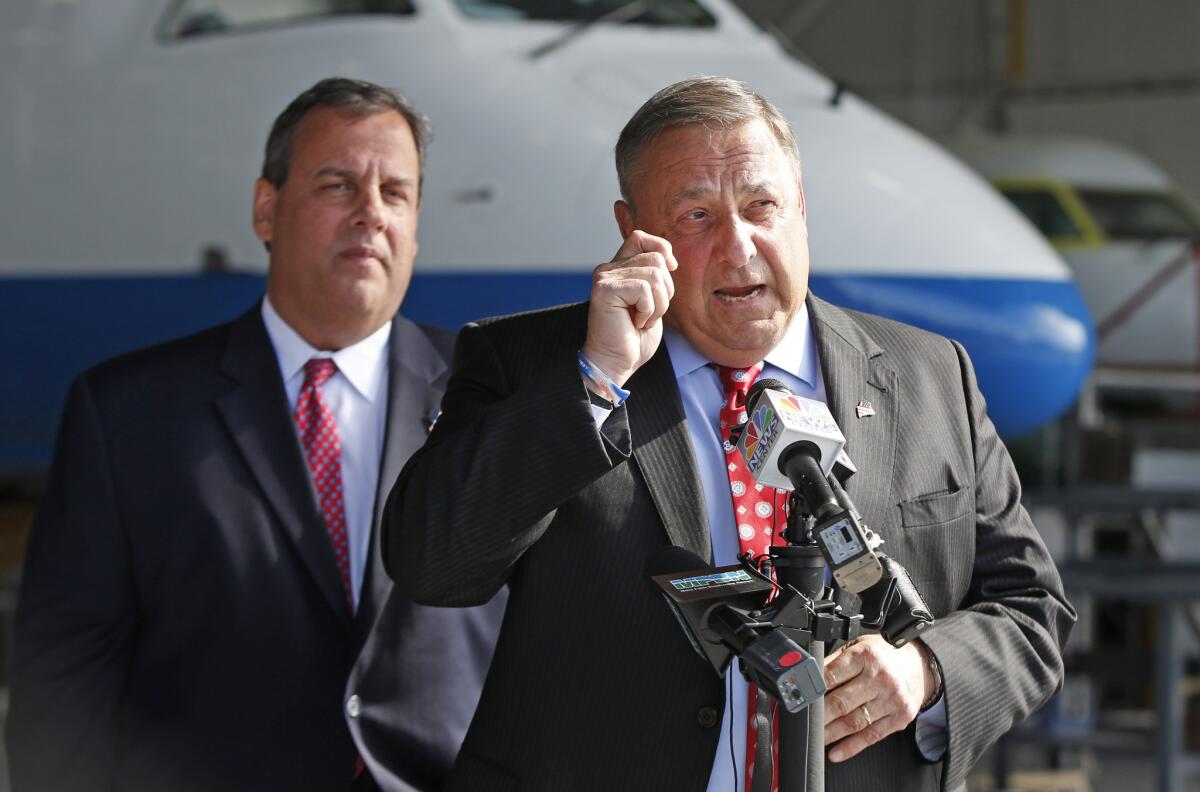Another GOP state may be signing up for Medicaid, and the reason is obvious

- Share via
Reports out of Cheyenne say that Wyoming is finally talking to federal officials about expanding Medicaid.
That would make Wyoming the 12th state with a Republican governor to expand Medicaid under the Affordable Care Act, leaving 16 with GOP leadership still in the “no expansion” column. The reason for Wyoming’s wavering is clear: It’s money.
The Health Department says Medicaid expansion could save the state $50 million or more if it expands the program, for which the federal government will pay at least 90%. Meanwhile, Wyoming hospitals say they’re losing more than $200 million a year in uncompensated care for people without insurance.
The state Legislature has rejected the expansion, but Republican Gov. Matt Mead has been saying it’s time to pack up. He’s entering negotiations with the feds for a way to expand Medicaid next year, covering as many as 17,600 low-income residents.
Mead’s actions reflect some realities about the Affordable Care Act that may finally be hitting home for GOP state leaderships. One is that shunning Medicaid expansion is a fiscal and public health disaster, any way you cut it. (See accompanying graphic.)
The latest estimates from the Robert Wood Johnson Foundation place the lost federal funding and hospital reimbursements in the 24 holdout states at $600 billion through 2022. (Four of those states, not counting Wyoming, are considering expansions or working out deals with the federal government.) The financial return is fabulous: for every dollar a state spends expanding Medicaid, the foundation calculated, it receives $13.41 in federal funding.
Like Wyoming, the other holdouts are facing increased pressure from hospitals to sign up. It’s a matter of dollars and cents for them, too. A few weeks ago, Tenet Healthcare, which operates 80 hospitals around the country, reported that uninsured plus charity admissions had declined by more than 54% at the five Medicaid-expanding states where it operates.
Another factor is political: The Affordable Care Act may be unpopular when it’s identified as “Obamacare,” but governors who block access to health insurance for their constituents are beginning to look even more unpopular.
That’s the finding of Princeton University’s Sam Wang, who made his name as a political analyst by giving Nate Silver a run for his money during the 2012 Presidential election. In a recent analysis for the New Yorker (h/t Kevin Drum), Wang determined that Republican governors facing reelection who have resisted Medicaid expansion are racking up lousy polling numbers; those who have fallen in with a more practical approach, such as Ohio’s John Kasich, New Mexico’s Susana Martinez and Michigan’s Rick Snyder, are doing better. (See Wang’s accompanying chart.)
Wang acknowledges that voters may not be judging these candidates entirely on the Affordable Care Act, even though “crusading against Obamacare has been a core part of the G.O.P. playbook.”
Opposition to Medicaid expansion may serve more as a signpost for Republican true-believer candidates. Some of them have moved well to the right of the voting public. Sam Brownback of Kansas, whose poll results look like the proverbial dog’s breakfast, has made an utter mess of his state through his obdurate right-wingerism. (We reported on the wreckage here.)
Then there’s Maine’s Paul LePage, who comes under the category of what Andy Kaufman’s character on “Taxi,” Latka Gravas, probably would call a “horse’s yaktabe.” (Politico calls him “America’s craziest governor.”)
Indeed, there are more examples of Republican candidates and incumbents who earlier hung their appeal on overturning the Affordable Care Act now trying to straddle the fence -- preserving the anti-Obamacare rhetoric, but acknowledging that the act brings benefits to constituents that can’t easily be taken away.
The law’s supporters understood this basic fact about social insurance: Once you’ve improved people’s lives, how can you tell them they’ll have to go back to the old ways?
Keep up to date with The Economy Hub by following @hiltzikm.
More to Read
Inside the business of entertainment
The Wide Shot brings you news, analysis and insights on everything from streaming wars to production — and what it all means for the future.
You may occasionally receive promotional content from the Los Angeles Times.











